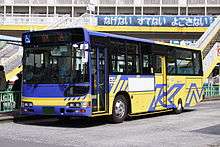Definify.com
Webster 1913 Edition
Bus
Bus
,Definition 2026
Bus
Bus
bus
bus
English

Noun
- (automotive) A motor vehicle for transporting large numbers of people along roads.
- An electrical conductor or interface serving as a common connection for two or more circuits or components.
- (medical industry, slang) An ambulance.
Synonyms
- (vehicle): coach, loser cruiser, motorbus, omnibus
- (electrical conductor): electrical bus, busbar, digit trunk
Derived terms
Descendants
- Chinese:
- Cantonese: 巴士 (bāshì)
Translations
|
|
Verb
bus (third-person singular simple present busses or buses, present participle bussing or busing, simple past and past participle bussed or bused)
- (transitive, automotive, transport) To transport via a motor bus.
- (transitive, automotive, transport, chiefly US) To transport students to school, often to a more distant school for the purposes of achieving racial integration.
- 2008, Ashley R. Holm, Racial Differences in Student Engagement and Attainment: A Study of Topeka High School, 1939--1984, ProQuest (ISBN 9780549750758), page 23
- ...to strike down Detroit's federal court order to bus students across school district lines for the purpose of desegregation and therefore nullify many busing programs throughout the country.
- 2008, Ashley R. Holm, Racial Differences in Student Engagement and Attainment: A Study of Topeka High School, 1939--1984, ProQuest (ISBN 9780549750758), page 23
- (intransitive, automotive, transport) To travel by bus.
- (transitive, US, food service) To clear meal remains from.
- He bussed tables as the restaurant emptied out.
- (intransitive, US, food service) To work at clearing the remains of meals from tables or counters; to work as a busboy.
- He’s been bussing for minimum wage.
Usage notes
The Canadian Oxford Dictionary only presents the spellings buses, busing, and bused, implying that these are the predominant forms in Canada.
Derived terms
- (clear meal remains): busboy
Translations
Anagrams
Catalan
Etymology 1
Cognate to Spanish buso (“underwater snail”) and Portuguese búzio (“underwater snail”), from Latin būcina (“horn”).
Noun
bus m, f (plural bussos)
Etymology 2
Probably from Old Norse buza (“big wide ship”).
Noun
bus m (plural bussos)
- (archaic) A large sailing ship used in the 12th and 13th centuries, broad of beam and with two or three masts.
Etymology 3
Probably from Persian بوس (bus, “kiss”).
Noun
bus m (plural busos)
- (archaic) flattery
Usage notes
Only found in the phrase fer lo bus (“to kiss up”).
Etymology 4
Reduction of autobús
Noun
bus m (plural busos)
- bus (vehicle)
Etymology 5
Noun
bus m (plural busos)
- bus (electrical connector)
Danish
Etymology
Shortening of omnibus, from French omnibus, from Latin omnibus (“for all”), dative plural of omnis (“all”).
Pronunciation
- IPA(key): /bus/, [b̥us]
Noun
bus c (singular definite bussen, plural indefinite busser)
Inflection
Dutch
Pronunciation
- Rhymes: -ʏs
- IPA(key): /bʏs/
Etymology 1
Shortening of omnibus, from Latin omnibus (“for everything/all”); dative plural of omnis (“all”).
Noun
bus m (plural bussen, diminutive busje n)
- (transport) bus, omnibus (vehicle)
- (transport, in diminutive) minibus, minivan
- bus (electrical conductor)
Derived terms
Etymology 2
From Old Dutch *bussa, from Proto-Germanic *buhsijōn, *buhsuz. Compare German Büchse.
Noun
bus f (plural bussen, diminutive busje n)
Derived terms
- brievenbus
- drinkbus
Verb
bus
French
Etymology 1
Pronunciation
Noun
bus m, f (plural bus)
Synonyms
Etymology 2
Inflected forms.
Pronunciation
Verb
bus
Verb
bus m pl
- masculine plural of the past participle of boire
Irish
Etymology
Pronunciation
- IPA(key): [bˠʊsˠ]
Noun
bus m (genitive singular bus, nominative plural busanna)
Declension
Fourth declension
|
Bare forms
|
Forms with the definite article
|
Derived terms
Mutation
| Irish mutation | ||
|---|---|---|
| Radical | Lenition | Eclipsis |
| bus | bhus | mbus |
| Note: Some of these forms may be hypothetical. Not every possible mutated form of every word actually occurs. | ||
Lithuanian
Pronunciation
- IPA(key): [bʊs]
Verb
bùs
- third-person singular future tense of būti.
- third-person plural future tense of būti.
- third-person singular future tense of busti.
- third-person plural future tense of busti.
Middle Irish
Etymology
From Proto-Celtic *bussus, from Proto-Indo-European *bʰew- (“to swell, bulge”).
Noun
bus (gender unknown)
- (rare, poetic) lip
References
- “4 bus” in Dictionary of the Irish Language, Royal Irish Academy, 1913–76.
- Matasović, Ranko (2009), “*bussu-”, in Etymological Dictionary of Proto-Celtic (Leiden Indo-European Etymological Dictionary Series; 9), Leiden: Brill, ISBN 978-90-04-17336-1, page 84
Polish
Etymology
Contraction of autobus, borrowed from English bus.
Pronunciation
- IPA(key): /bus/
Noun
bus m anim (diminutive busik)
- (colloquial) bus
Declension
Romagnol
Pronunciation
- IPA(key): /bus/
Noun
bus m
- hole
- September 2012, Daniela Cortesi, Bônanòta in la Ludla, il Papiro, page 15:
- un sorg e’ cor in priscia int e’ su bus.
- a mouse runs hastily towards its hole.
- un sorg e’ cor in priscia int e’ su bus.
- September 2012, Daniela Cortesi, Bônanòta in la Ludla, il Papiro, page 15:
Scottish Gaelic
Etymology 1
Noun
bus m (genitive singular bus, plural busaichean)
Etymology 2
Noun
bus m (genitive singular buis, plural buis or busan)
- pout (facial expression)
Swedish
Etymology
From the verb busa (“to do mischief”).
Pronunciation
- IPA(key): [bʉ͍ːs]
- Rhymes: -ʉːs
Noun
bus n (uncountable)
- very innocent mischief, prank
- Trick or Treat is often translated with Bus eller godis
- general noise or trouble made by gangs of youths
Declension
Derived terms
Tok Pisin
Etymology
Noun
bus
- bush (remote rural areas)
- 1989, Buk Baibel long Tok Pisin, Bible Society of Papua New Guinea, Genesis 1:25 (translation here):
- God i kamapim ol kain kain animal bilong ples na ol bikpela na liklik animal bilong bus. God i lukim olgeta dispela samting i gutpela, na em i amamas.
- 1989, Buk Baibel long Tok Pisin, Bible Society of Papua New Guinea, Genesis 1:25 (translation here):